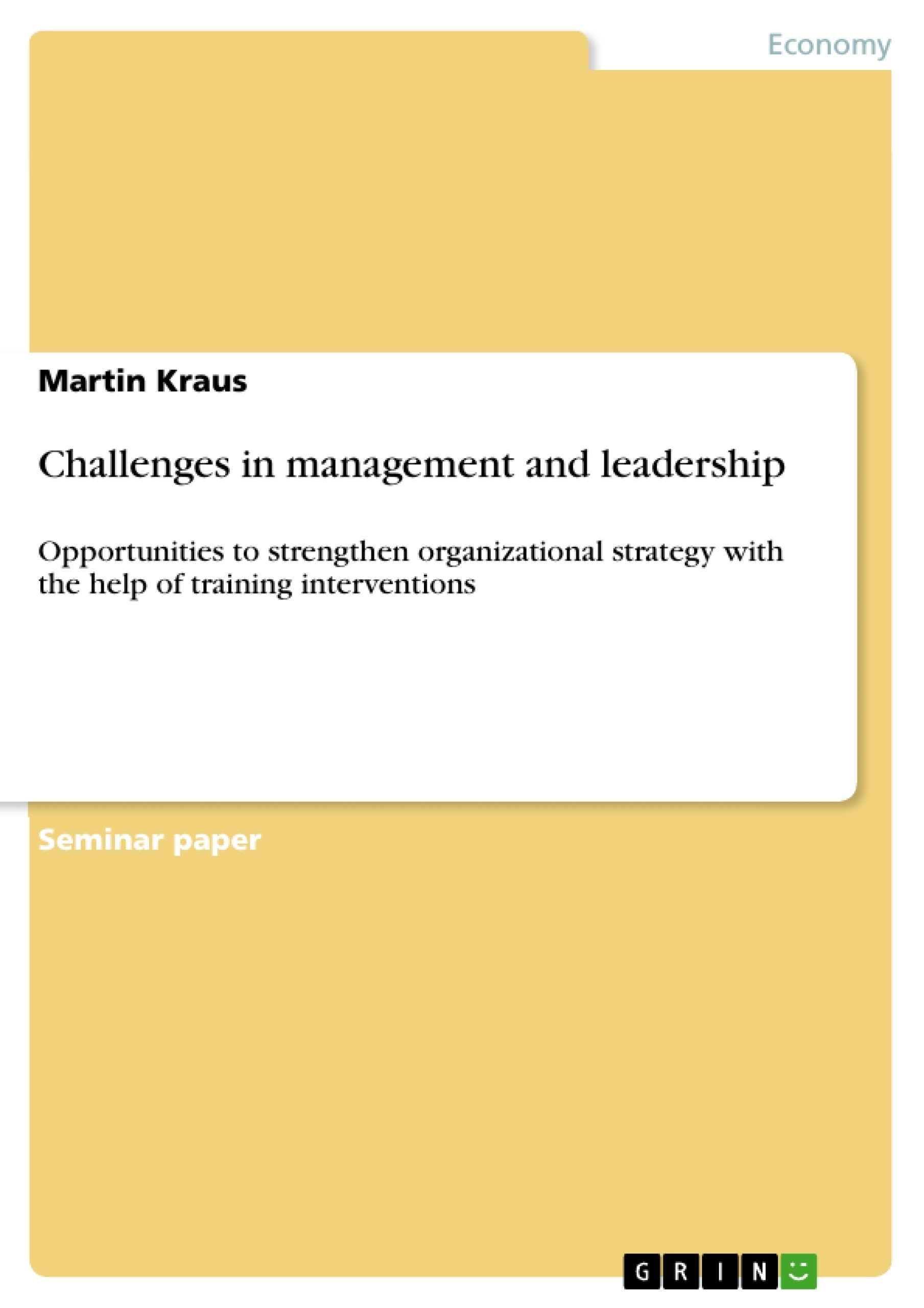... The science of human resources management started at the beginning of the 20th century. Training, especially relating to organizations, is a field of research which had not been intensive explored before the last ten to twenty years. This changed with the beginning of the above described development of markets and technology. Fundamental analyses about reorganization and also possible training interventions have taken place. To survive the following years, organizations have to acquire the recent findings of scientific research to gain a competitive advantage.
In the following paper, opportunities to strengthen organizational strategy with the help of training interventions will be discussed. First, the terms of ‘training intervention’ and ‘training’ as well as ‘organizational strategy’ will be defined in the next chapter. Afterwards training methods and their utility for organizations will be discussed, and a conclusion will be made.
Inhaltsverzeichnis (Table of Contents)
- Training interventions as a special need in globalizing markets
- Definition of ‘training intervention' and ‘organizational strategy'
- Organizational strategy
- Training as a special form of learning and teaching
- Training interventions
- Role playing
- Experiencing new ways to act in role playing
- Improving organizational efficiency
- Problem solving groups
- Problem solving groups used as on-the-job training
- Cost-effective method for improving organizational efficiency
- Coaching
- Adoption to the individual problems of an employee
- Highly individual, but also expensive
- Project work and project learning
- Developing social competencies
- Main influence on human resources
- E-Collaboration
- Combination of traditional training methods with new media
- Efficiency and cost control
- Training interventions help to strengthen organizational strategy
Zielsetzung und Themenschwerpunkte (Objectives and Key Themes)
This term paper examines the role of training interventions in strengthening organizational strategy, particularly within the context of globalizing markets. It explores how training can help companies adapt to increasingly competitive markets, shorter product life cycles, and rapid technological advancements.
- The importance of training in a globalized business environment
- The definition and significance of training interventions and organizational strategy
- An overview of various training methods and their respective benefits for organizations
- The impact of training interventions on organizational effectiveness and competitive advantage
- The role of training in developing employee skills and fostering organizational adaptability
Zusammenfassung der Kapitel (Chapter Summaries)
- Chapter 1: Training interventions as a special need in globalizing markets: This chapter introduces the growing need for training interventions in organizations, highlighting the increasing competitive pressures and the importance of adaptability in a globalized marketplace. It explores the evolution of organizational theories and how training has become a crucial factor in organizational success.
- Chapter 2: Definition of ‘training intervention' and ‘organizational strategy': This chapter defines the key concepts of “training intervention” and “organizational strategy” by examining various definitions from renowned scholars. It provides a comprehensive understanding of these terms and their implications for organizational development.
- Chapter 3: Training interventions: This chapter delves into various training interventions, such as role playing, problem solving groups, coaching, project work, and e-collaboration. It analyzes the strengths and weaknesses of each method and their specific applications within organizations.
Schlüsselwörter (Keywords)
The main keywords and focus topics include training interventions, organizational strategy, globalizing markets, organizational adaptability, training methods, role playing, problem solving groups, coaching, project work, e-collaboration, employee development, and competitive advantage.
Frequently Asked Questions
What is a training intervention in management?
A training intervention is a planned activity or program designed to improve employee skills and organizational performance to meet strategic goals.
How does training support organizational strategy?
It ensures that employees have the necessary competencies to adapt to market changes, technological advancements, and competitive pressures.
What are the benefits of coaching in organizations?
Coaching provides highly individual support for employees, helping them solve specific problems and develop leadership potential, though it can be expensive.
What is E-Collaboration in training?
It combines traditional training methods with digital media, allowing for efficient, cost-effective, and flexible learning across different locations.
Why is role playing used as a training method?
Role playing allows employees to experience and practice new ways of acting in a safe environment, which improves social skills and organizational efficiency.
What are problem solving groups?
These are on-the-job training methods where groups of employees work together to find solutions to real organizational issues, fostering teamwork and innovation.
- Arbeit zitieren
- Martin Kraus (Autor:in), 2006, Challenges in management and leadership, München, GRIN Verlag, https://www.grin.com/document/77081



